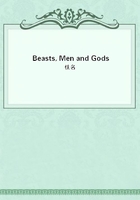
第12章 A RIVER IN TRAVAIL(2)
Watching this glorious withdrawal of the ice, I was filled with terror and revolt at seeing the awful spoils which the Yenisei bore away in this annual retreat. These were the bodies of the executed counter-revolutionaries--officers, soldiers and Cossacks of the former army of the Superior Governor of all anti-Bolshevik Russia, Admiral Kolchak. They were the results of the bloody work of the "Cheka" at Minnusinsk. Hundreds of these bodies with heads and hands cut off, with mutilated faces and bodies half burned, with broken skulls, floated and mingled with the blocks of ice, looking for their graves; or, turning in the furious whirlpools among the jagged blocks, they were ground and torn to pieces into shapeless masses, which the river, nauseated with its task, vomited out upon the islands and projecting sand bars. I passed the whole length of the middle Yenisei and constantly came across these putrifying and terrifying reminders of the work of the Bolsheviki. In one place at a turn of the river I saw a great heap of horses, which had been cast up by the ice and current, in number not less than three hundred. A verst below there I was sickened beyond endurance by the discovery of a grove of willows along the bank which had raked from the polluted stream and held in their finger-like drooping branches human bodies in all shapes and attitudes with a semblance of naturalness which made an everlasting picture on my distraught mind. Of this pitiful gruesome company I counted seventy.
At last the mountain of ice passed by, followed by the muddy freshets that carried down the trunks of fallen trees, logs and bodies, bodies, bodies. The fisherman and his son put me and my luggage into their dugout made from an aspen tree and poled upstream along the bank. Poling in a swift current is very hard work. At the sharp curves we were compelled to row, struggling against the force of the stream and even in places hugging the cliffs and making headway only by clutching the rocks with our hands and dragging along slowly. Sometimes it took us a long while to do five or six metres through these rapid holes. In two days we reached the goal of our journey. I spent several days in this gold mine, where the watchman and his family were living. As they were short of food, they had nothing to spare for me and consequently my rifle again served to nourish me, as well as contributing something to my hosts. One day there appeared here a trained agriculturalist. I did not hide because during my winter in the woods I had raised a heavy beard, so that probably my own mother could not have recognized me. However, our guest was very shrewd and at once deciphered me. I did not fear him because I saw that he was not a Bolshevik and later had confirmation of this. We found common acquaintances and a common viewpoint on current events. He lived close to the gold mine in a small village where he superintended public works. We determined to escape together from Russia. For a long time I had puzzled over this matter and now my plan was ready. Knowing the position in Siberia and its geography, I decided that the best way to safety was through Urianhai, the northern part of Mongolia on the head waters of the Yenisei, then through Mongolia and out to the Far East and the Pacific. Before the overthrow of the Kolchak Government I had received a commission to investigate Urianhai and Western Mongolia and then, with great accuracy, I studied all the maps and literature I could get on this question. To accomplish this audacious plan I had the great incentive of my own safety.